Photo: KQ Entertainment
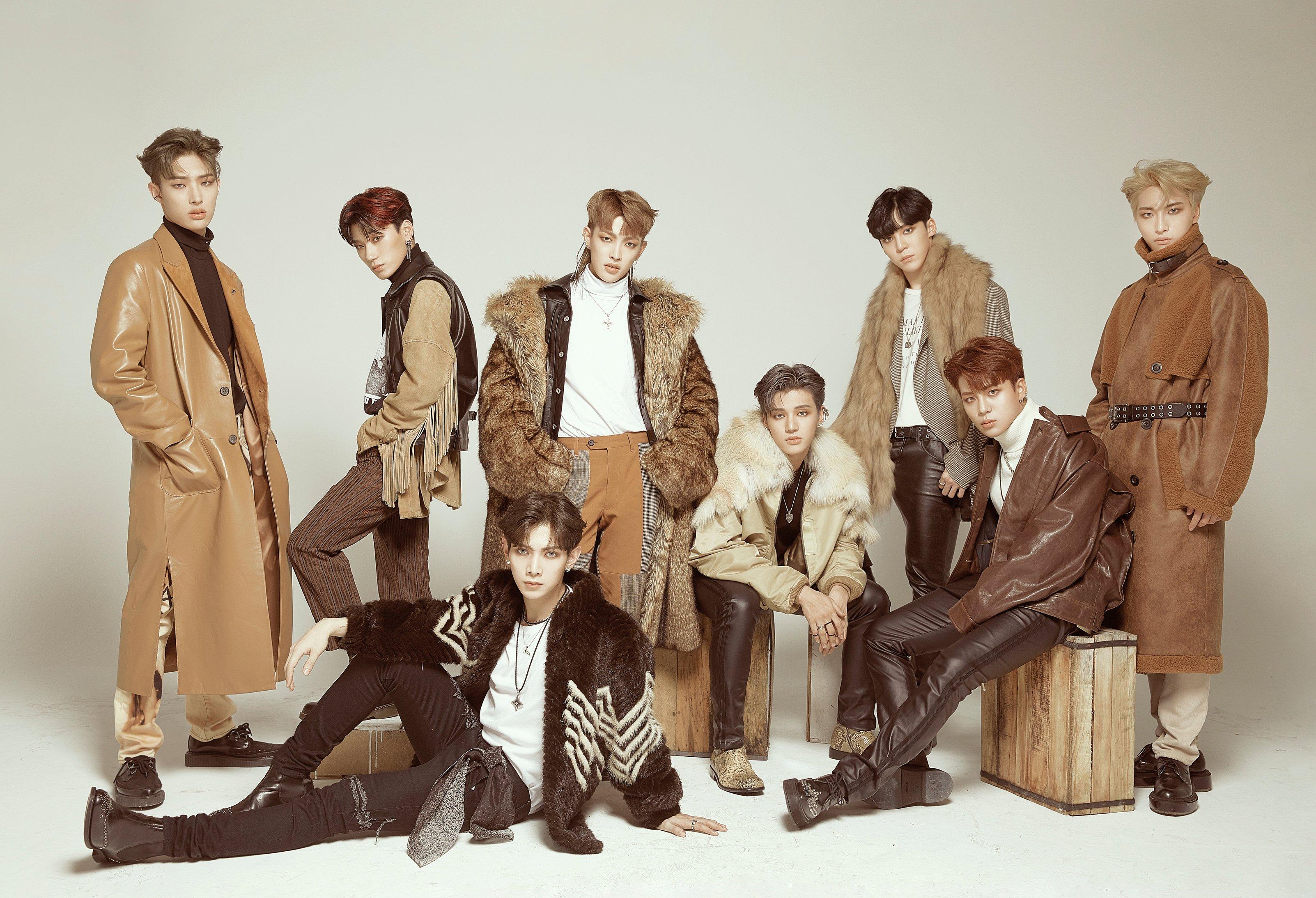
ATEEZ
news
Exclusive: ATEEZ Are Here To Win The Hearts Of K-Pop Fans
Meet the K-pop boy band making waves only months after debuting
In October 2018, ATEEZ, a new boy band determined to become a group fans could believe in, stepped onto the K-pop scene with their singles "Pirate King" and "Treasure" from their Treasure Ep.1: All To Zero EP.
As K-pop continues to expand in the U.S. with the popularity of BTS and BLACKPINK, thanks in part to the Hallyu, or "Korean wave," that has globalized the genre, ATEEZ have captured the curiosity of U.S. media. MTV said they were "poised to break big in 2019," and Billboard was quick to point out their chart success as their debut album landed on the World Charts, peaking at No.12.
Although the octet, made up of members Seonghwa, Yunho, Yeosang, San, Mingi, Wooyoung, Jongho, and Hongjoong, are new on the block, the charts back up their potential for mass success. Their second EP, Treasure EP 2 featuring the single "Say My Name," peaked at No. 5 on the Wolrd Albums and went to No. 7 on the Heatseekers Albums chart, which Billboard noted doesn't typically list many K-pop acts. Meanwhile, MTV reports that "Say My Name" saw "upwards of 1.4 million" views on YouTube in two days.
<iframe width="620" height="349" src="https://www.youtube.com/embed/nKU4OVH18mE" frameborder="0" allow="accelerometer; autoplay; encrypted-media; gyroscope; picture-in-picture" allowfullscreen></iframe>
But rather than focus too much on where they stand compared to veterans K-pop groups, whom they refer to as their seniors, the young band (the oldest member is 21) is humble about being new to the game, even if they've already had a taste of success in the U.S.
"We’re still rookies who lack a lot to even consider competing against other artists," Seonghwa says. "But the reality is that we still have to grow amongst the competition, so we’re earnestly practicing and researching. We’re also strengthening our teamwork by talking amongst ourselves more."
The group looks up to the international Korean acts that paved the way for them and want to follow in their footsteps. For now, ATEEZ are working hard to show fans who they are through group expression, which U.S. followers will get to see live soon when their sold-out tour kicks off in Los Angeles on March 15, a feat within itself this early in their career.
So, how did ATEEZ end up touring the U.S. so soon? Well, turns out it was their fans, also known as "ATINY," made the tour happen through an online service called MyMusicTaste, which brings fans together to request their favorite artists' concerts, according to MyMusicTaste Head of Marketing and User Communication Sarah Shim.
And the band isn't stopping after their trip to the States; next up, they're embarking on a European tour. Still, despite their seeming ubiquity, not much is known about the driven young band. Chatting with the Recording Academy over email, ATEEZ told us about who they are, who they count as musical influences, what they think about K-pop groups before them, what's next for them, and more.
What's the story behind your name?
Seonghwa: There’s no specific story behind our name, but I can share the meaning of ATEEZ with you; ATEEZ stands for "A TEENager Z." It means we’re a team that can demonstrate the collective charms and styles of this generation’s teenagers. The name, "ATEEZ," was also created in the hopes that we would become a team that could get many people passionate about.
What are your musical influences?
Hongjoong: When I was young, I was greatly influenced by Michael Jackson. I still believe I’m being inspired by him even to this day. Other than musical influences, I’ve recently picked up redesigning old clothes as a hobby. Through this, I’ve been exposed to a lot of different creative elements so I’ve been getting inspiration from that as well. I also get inspired from fan letters we receive from our ATINY. In many ways, I think I’ve been getting inspiration from everything I see and experience in life.
Mingi: I think I get musically influenced whenever an artist I really like comes out with new music. If that artist took new challenges and incorporated unique elements in their work, I’ll focus on that and try to study it. I also get a lot of musical inspiration from dramas or animations.
Describe each member in one word:
Hongjoong on Seonghwa: Seonghwa is a "mom." Moms are people who firmly and steadily lead families, right? Within our team, Seonghwa warmly embraces our members. He also readily tackles difficult tasks or chores other people don’t want to do. That’s why we call him the “Mom of ATEEZ.”
Seonghwa on Yunho: Yunho is a "beagle" because he’s always overflowing with energy and has the ability to put people around him in a good mood, just like beagles do. I think the word “beagle” and everything it encompasses really matches Yunho.
Yunho on Yeosang: Yeosang is the embodiment of the word: "pure."
<iframe width="620" height="349" src="https://www.youtube.com/embed/YG3ZlU6sH-E" frameborder="0" allow="accelerometer; autoplay; encrypted-media; gyroscope; picture-in-picture" allowfullscreen></iframe>
Yeosang on San: San is "HALA HALA." I naturally think of the phrase "HALA HALA" when I think of San because I’ve been finding San’s HALA HALA performances especially charming these days.
San on Mingi: Doberman... I think Mingi really looks like those sturdy and trustworthy Doberman dogs.
Mingi on Wooyoung: Full-of-charms. Wooyoung is really charming and he’s really good at expressing it.
Wooyoung on Jongho: Strength. Jongho is the strongest out of ATEEZ so whenever I think of Jongho, I think of the word "strength." Jongho = strength.
Jongho on Hongjoong: Brain. I feel like Hongjoong-hyung is the brains of our team. He’s good at speaking but more than anything, he’s very logical and great at explaining things. No matter what happens, we feel confident because we have Hongjoong-hyung as our reliable brain.
Is there any U.S. artists with whom you'd like to collaborate?
Hongjoong: Post Malone.
Seonghwa: Justin Bieber.
Yunho: Maroon 5.
Yeosang: The Chainsmokers.
San: Shawn Mendes.
Mingi: MAX, Offset, Drake, Joey Bada$$.
Wooyoung: Shawn Mendes.
Jongho: Bruno Mars.
For Americans who are less familiar with the K-pop movement, how would you distinguish yourselves from other acts, like BTS or BLACKPINK?
Hongjoong: Rather than saying how different we are from our KPOP seniors, I’d rather talk about ATEEZ’s current goals and what we consider important when performing.
ATEEZ’s current goal is to follow in the footsteps of our KPOP seniors. What we consider the most important when performing is, "expression." As we have done up to now and will continue to do so in the future, we want to be able to better convey and express our energy directly to our fans.
You officially formed last year, and competition in the music industry can be fierce. Do you ever experience a sense of competition, and if so, what do you do to combat against it?
Seonghwa: We’re still rookies who lack a lot to even consider competing against other artists. But the reality is that we still have to grow amongst the competition, so we’re earnestly practicing and researching. We’re also strengthening our teamwork by talking amongst ourselves more.
K-pop has really exploded the last few years in the U.S. Does this get you more excited for your U.S. tour?
Hongjoong: Ever since I was really young, I watched videos of our senior artists performing abroad and in the States. Whenever I saw videos like that, I always thought to myself that I would like to stand on those stages as well. I truly believe the reason we, ATEEZ, were able to meet many international ATINYs so quickly after debuting was largely due to the previous hard work of our KPOP seniors. I'm looking forward to our upcoming tour because I feel like I can fulfill my childhood dreams of standing on those international stages through it.
Jongho: We're able to go on this tour thanks to the road our industry seniors paved for us and due to their hard work. Because they paved the road for K-Pop as a genre, and by virtue—us—K-Pop has been garnering a lot of attention from the world. We were able to attract international ATINYs' interest. We're diligently preparing for our tour in order to follow our seniors' footsteps. To be quite honest, I’m pretty nervous but excited at the same time. ATINY! Please look forward to our stages.
What is the inspiration behind "Say My Name"?
Hongjoong: "Say My Name" was a song we were preparing long before we worked on our previous single, "Pirate King," so we had a high level of understanding and anticipation for it. When we write our lyrics, we incorporate many elements to help us more strongly convey our aspirations and ambitions to the listener. We had hidden spellings in the lyrics of “Say My Name," so when read vertically they came together to spell A.T.E.E.Z. We worked on this song with the goal of solidifying ATEEZ’s name and presence.
Eweossa dureugo jigyeobwa (Wrap around me and watch over me)
Ireum ttak ne geulja yeogida (These four letters, it’s right here)
Ti nage namgyeonwa (Leave it behind so it’s noticeable)
Zoom in here, Cause I’m the Captain
When the bolded letters are read out loud, they sound like E.I.T.Z (ATEEZ)
What can fans expect on the tour?
Hongjoong: This might be the first time many of our overseas fans will see us perform live. I think when you see our stages in person, it’ll be a whole nother experience from watching us online or through a medium—you’ll be able to witness a much more powerful and engaging performance live.
Seonghwa: If you watch our performances in person, you’ll be able to more vividly experience and feel ATEEZ’s energy.
Yunho: You won’t be able to escape our charms after seeing ATEEZ live.
Yeosang: Yeosang’s charms, of course.
San: I think international fans didn’t have many opportunities to see us live yet. When you see us singing and dancing in person, I don’t think you’ll be able to escape ATEEZ.
Mingi: Our performance. You’ll be able to directly feel our energy. We’re practicing really hard so please look forward to it!
Wooyoung: The various charms of our eight members, and our performances. All eight of us have very different charms and strengths. Through this tour, I’d like to show all our colors to our international ATINYs.
Jongho: We've prepared a lot of things to show you. Please look forward to them!
When can we expect a full-length album? What's next for you?
Hongjoong: It wouldn’t be much fun if I revealed when our full-length album might be released, right? I’ll just say that our album is part of a much bigger picture and story that is continuously being built! I think that’s all I can tell you for now…
We're thinking of this upcoming tour as a starting point and are planning to keep working hard in order to be acknowledged not just in Korea, but abroad as well. We’re also diligently preparing right now in order to meet and be closer to our fans, so you’ll be able to see us more often in 2019. Everyone: Please look forward to it, and please love us a lot!
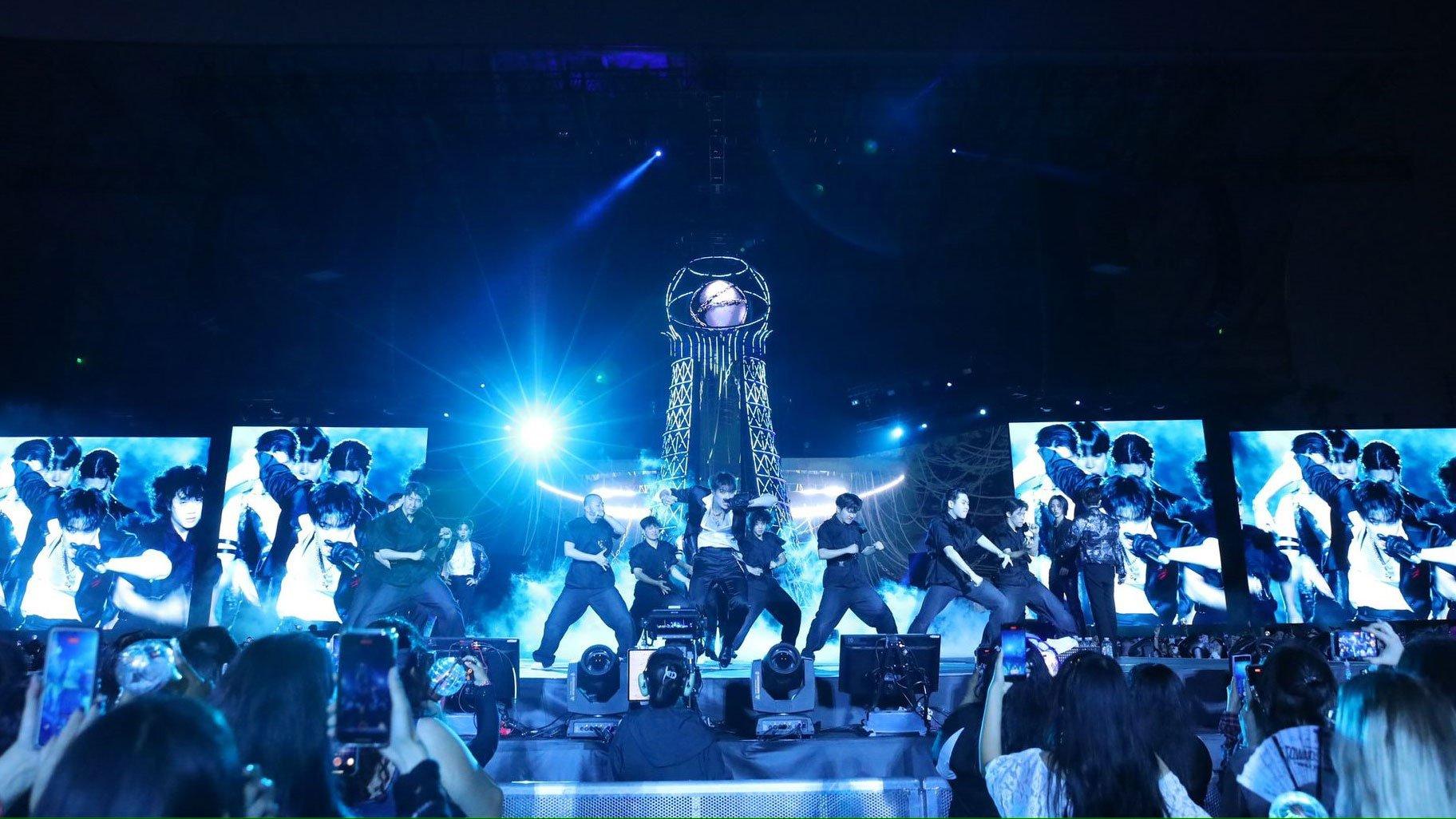
Photo: KQ Entertainment
news
ATEEZ’s First U.S. Stadium Show Was A Triumph & Testament To Their Growth
During two performances at L.A.'s BMO Stadium, the fast-rising K-pop boy group dazzled audiences with drama, dance, and a deep appreciation for how far they've come.
On July 20, K-pop boy group ATEEZ stepped foot onto one of their largest stages yet for their first U.S. stadium show. The scene at Los Angeles’ open-air BMO Stadium was a far cry from the group's L.A. performance in 2019 — their first tour stop ever — at the petite Globe Theater, a former movie palace with a tenth of BMO’s capacity.
Even then, as a five-month-old rookie group, fans (called ATINYs) saw a remarkable promise in Hongjoong, Seonghwa, Yunho, Yeosang, San, Mingi, Wooyoung, and Jongho. In the years since, ATEEZ has developed a growing presence in the States, even being the subject of a first-of-its-kind GRAMMY Museum pop-up. If the BMO Stadium performance was any indication, ATEEZ have officially hit their stride.
Read more: Inside The GRAMMY Museum's ATEEZ & Xikers Pop-Up: 5 Things We Learned
The nearly sold-out July 20 show felt like a level up, and not just because of the size of the venue. "As we performed, I really felt like ATEEZ has grown so much," singer Yunho said near the end of the night. He’s not wrong: they’re undoubtedly more confident than ever. Perhaps that’s because the octet made history earlier this year as the first K-pop boy group to perform at Coachella. Regardless, ATEEZ's growth in both production and showmanship was palpable.
If you missed ATEEZ’s two nights in L.A., don’t worry: K-pop’s resident pirate kings (more on that title later) have more up their billowy sleeves. In the spirit of their never-ending grind, the Towards the Light: Will to Power tour has nine more North American stops, including New York’s Citi Field. Read on to find out why you won’t want to miss these fast-rising K-pop idols.
The Members Are As Good Apart As Together
ATEEZ’s motto is "eight makes one team" for good reason. Individually, their talents and tastes are prismatic, yet complement each other perfectly — a fact that comes into startling clarity midway through the show, when the group breaks off into units and solos.
Equal parts erotic and controlled, trap banger "IT’S You" gives Yeosang, San, and Wooyoung room to deploy their enigmatic charms as a trio; ATEEZ’s purveyor of belted high notes, Jongho, dips into his deeper register on solo ballad "Everything"; diametric duo Hongjoong and Seonghwa spit fire about the rapport that arises from their differences on red-hot cypher "MATZ": "M-A-T-Z like allergy, we don’t really fit together / Yeah, yeah, but on stage, reacting to that synergy."
Then there’s the wistful "Youth" from dance class pals Yunho and Mingi. The two go way back — something they reminded audiences of by acting out a fictionalized version of a real phone call they shared the day before auditioning for KQ Entertainment. "Imagine us taking the stage together someday," Yunho said. "Sounds amazing, right?"
Read more: ATEEZ Are Here To Win The Hearts Of K-Pop Fans
ATEEZ Know How To Turn Up The Drama
ATEEZ's lore runs deep. In their conceptual universe, what began as a swashbuckling tale of pirates in search of treasure evolved into an anarchic manifesto about toppling the world order. Recently, in a Wild West turn, they’ve been masquerading as cowboys dedicated to the daily hustle.
Every ATEEZ performance has a story; on this tour, the theme is light. But, as always in ATEEZ’s oeuvre, that light can’t exist without a darkness seeking to quash it. The way they convey this narrative — acting, stage decoration, extras — is a masterclass in drama, fit for the theater as much as a stadium.
Watch: Global Spin: Watch Ateez Represent South Korea With Kinetic Performance Of "The Real"
They’re In Their Element Onstage
The success of ATEEZ’s storytelling is bolstered by the group’s unearthly stage presence. In that regard, Seonghwa led the pack, moving like a man possessed. Whether crawling on his knees, rolling his eyes back, or slinging a sword to symphonic backing, the lithe dancer never let the air-tight facade slip — except, of course, when it came time to offer a couple of warm words to fans.
Like Seonghwa, the rest are also shockingly versatile. San effortlessly switches between agile body rolls and thigh caresses in the dangerously sensual "Cyberpunk," then vigorously glides his arms through air at the climax of "Say My Name," a gesture that has only grown in power and potency over time.
ATINYs Do Their Best To Match ATEEZ’s Energy
"There [are] more than 20,000 singers in here," Hongjoong said as the lead-in to the soaring "Dance Like Butterfly Wings." "Can you show me your singing?"
Sing they did: All night, the crowd brought an energy as fierce and passionate as ATEEZ, especially when barking at charismatic rapper Mingi, much to his apparent enjoyment.
But the single noisiest moment came during "Guerilla." At a certain point, Yunho shouted a ferocious "Make some noise!" as a cue and ATINYs know it’s time to warm up their vocal chords; while Jongho belts some of his highest notes yet, fans roared "Break the wall!" at the top of their lungs, loud enough to rise above the stadium enclosure.
Fan chants and cheers are a mainstay of K-pop shows in South Korea, but due to differences in concert etiquette and language barriers, most don’t make their way overseas. ATEEZ and their fans broke that wall, and built a bridge in its place.
It’s A Full Circle Moment In Their Career
That ATEEZ chose to drop anchor in Los Angeles for their first U.S. stadium show feels especially momentous. The band has history in Southern California, having trained at L.A.-based dance studios Movement Lifestyle and Millenium Dance Center prior to their debut. ("Our second hometown!" San said during the show.)
"Even though it was six years ago, it feels like just yesterday," Hongjoong said in his encore speech. "It’s absolutely an honor to be right here, now, in such a big venue."
That’s a short time to come as far as they have, without slowing pace. "But, you know, it doesn’t stop," Hongjoong continued. "We will keep going to the next step and the next step, with you. Let’s keep making moments to shine even brighter, together." And if these three hours are any indication, ATEEZ has a light that won’t soon be dimmed.
More News About ATEEZ
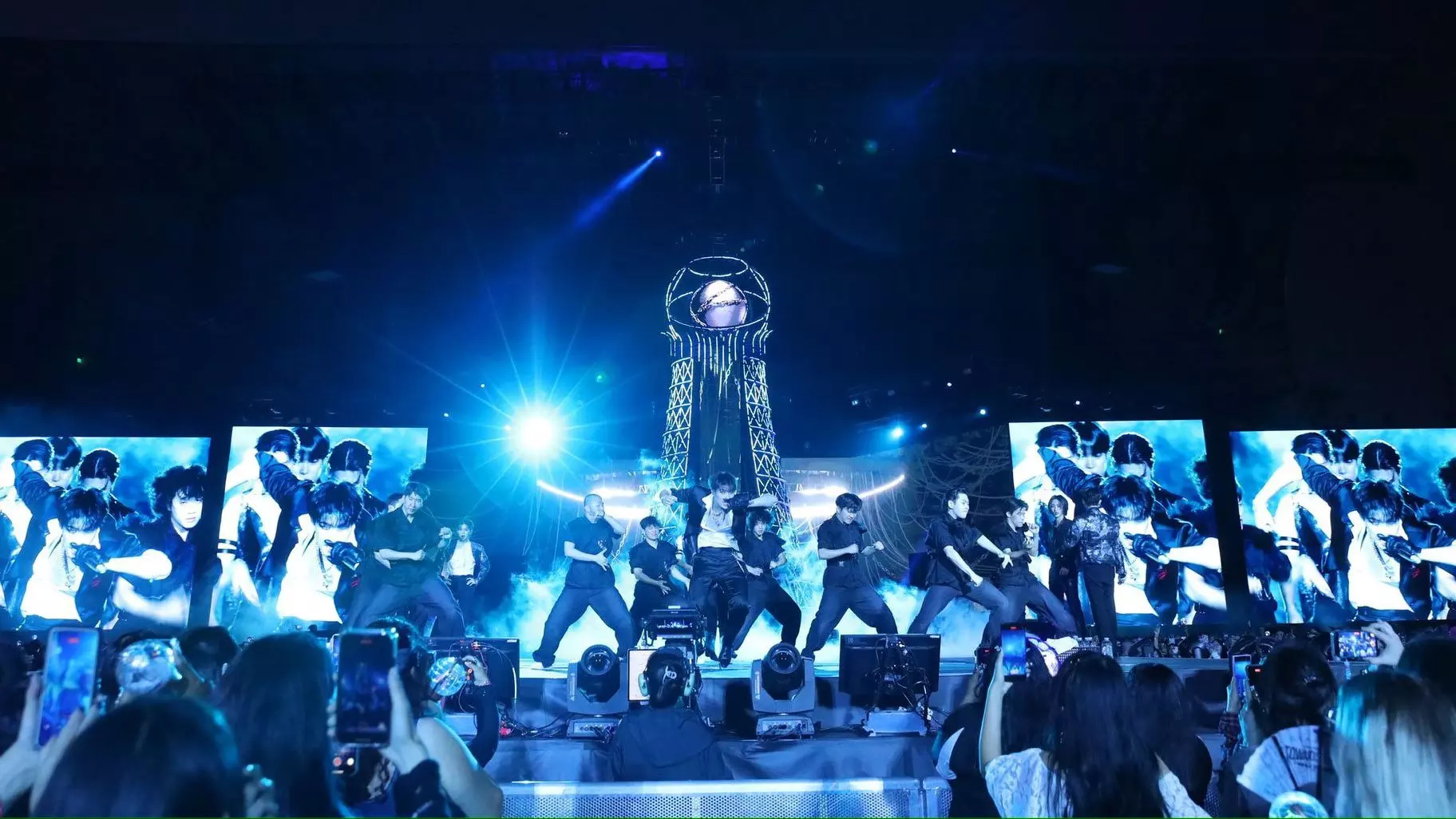
ATEEZ’s First U.S. Stadium Show Was A Triumph & Testament To Their Growth
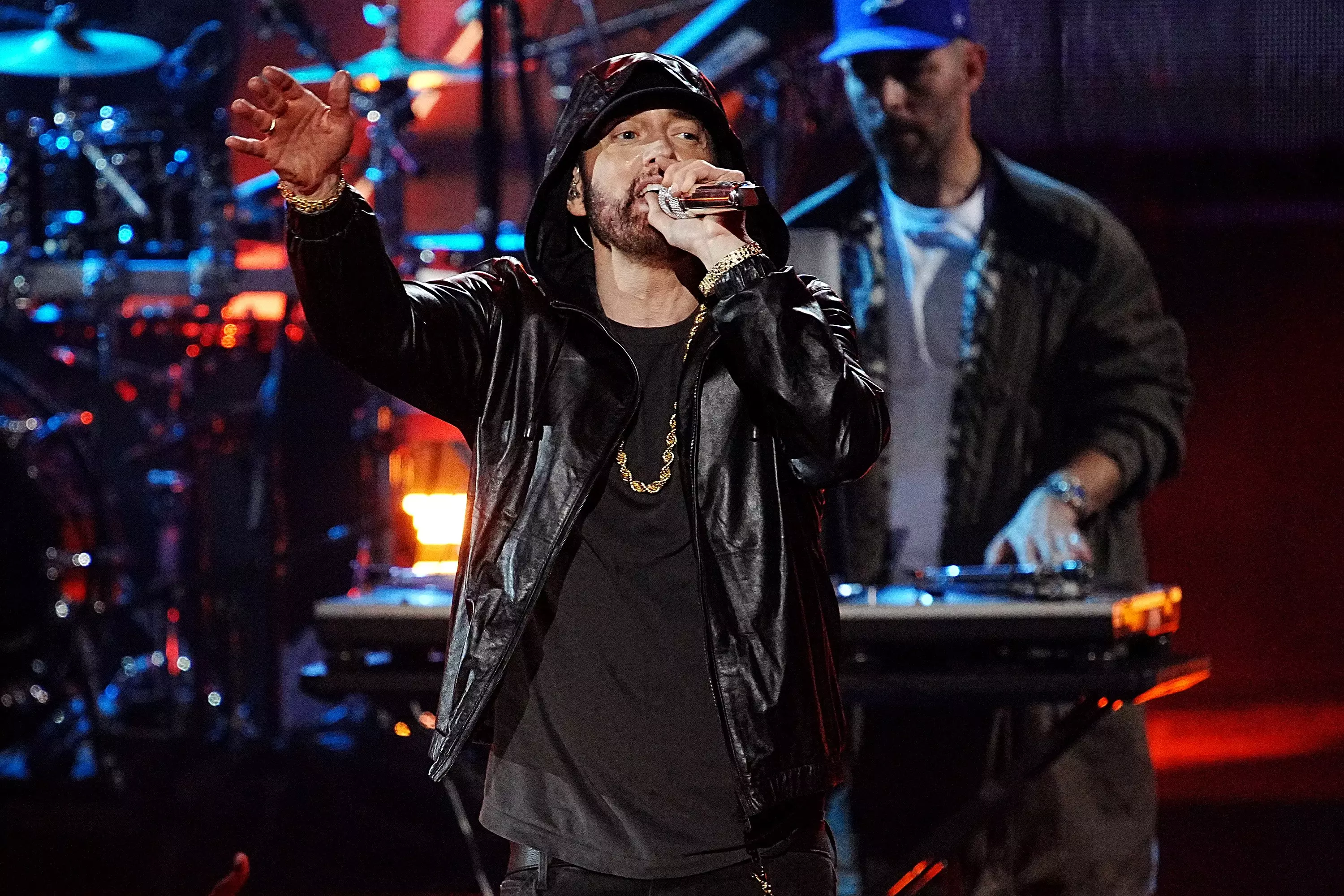
New Music Friday: Listen To New Albums & Songs From Eminem, Maya Hawke, ATEEZ & More
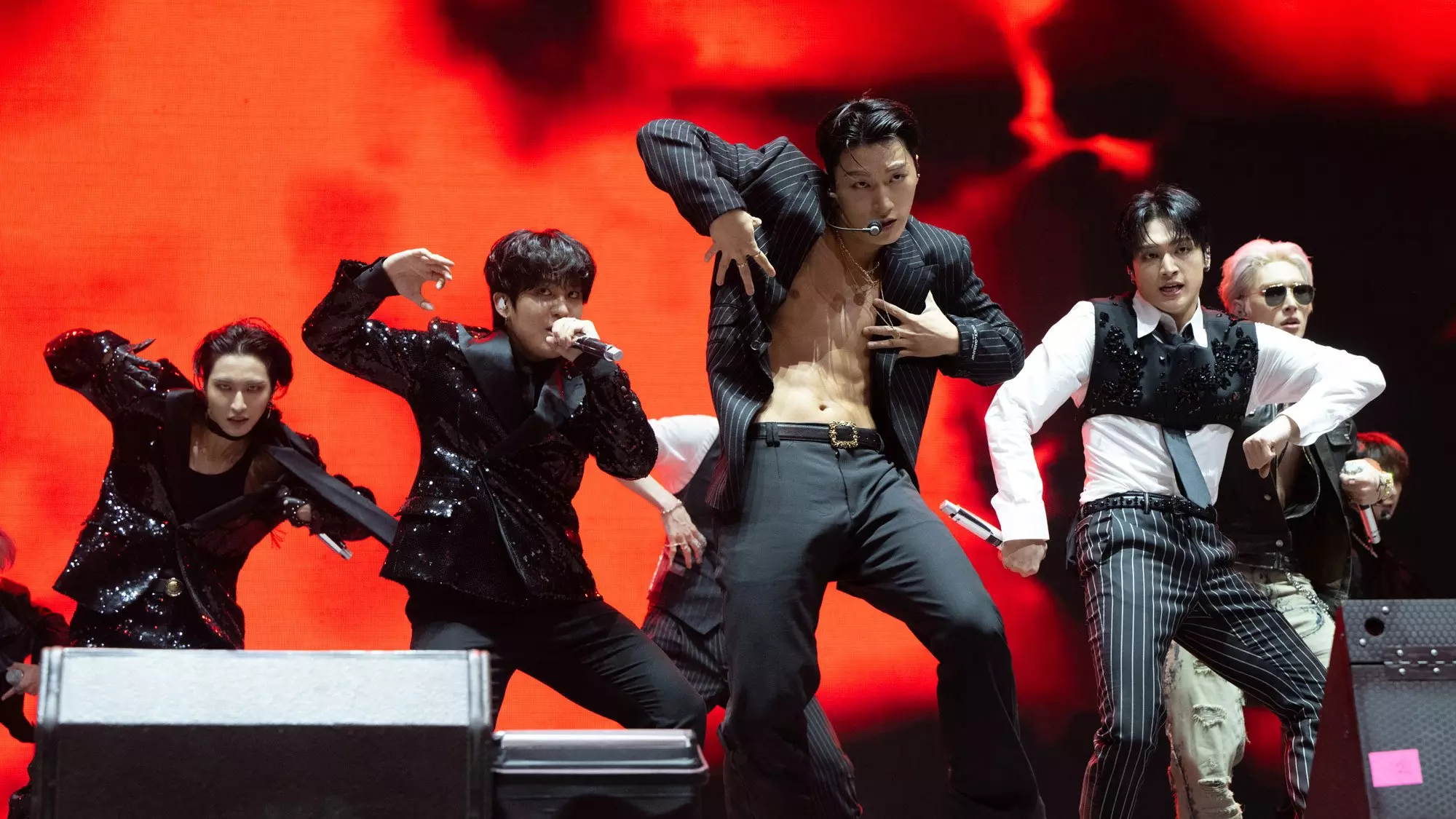
K-Pop Summer 2024 Guide: ATEEZ, IU, TXT & More Live In Concert & On Tour
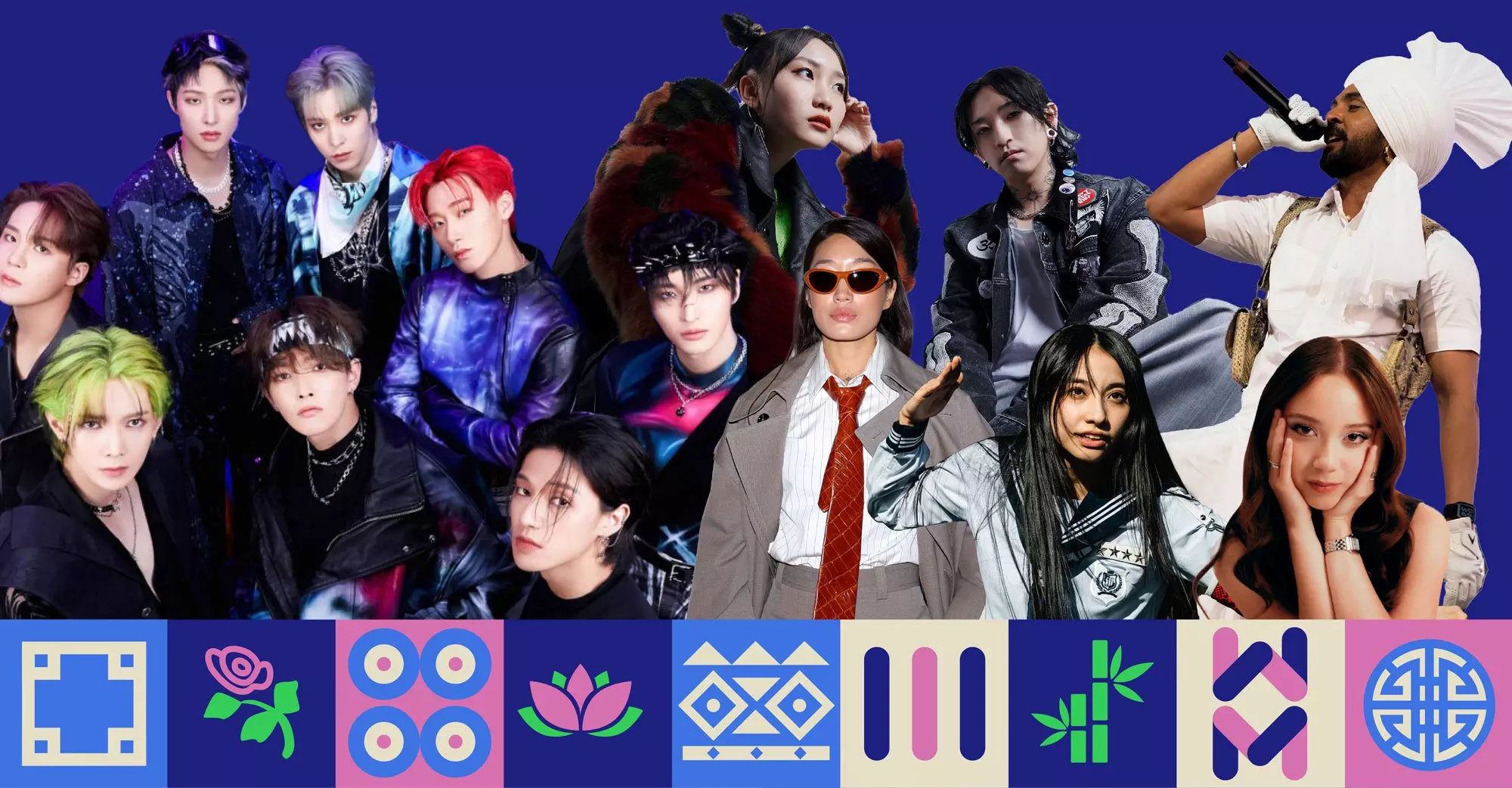
Leap Into AAPI Month 2024 With A Playlist Featuring Laufey, Diljit Dosanjh, & Peggy Gou
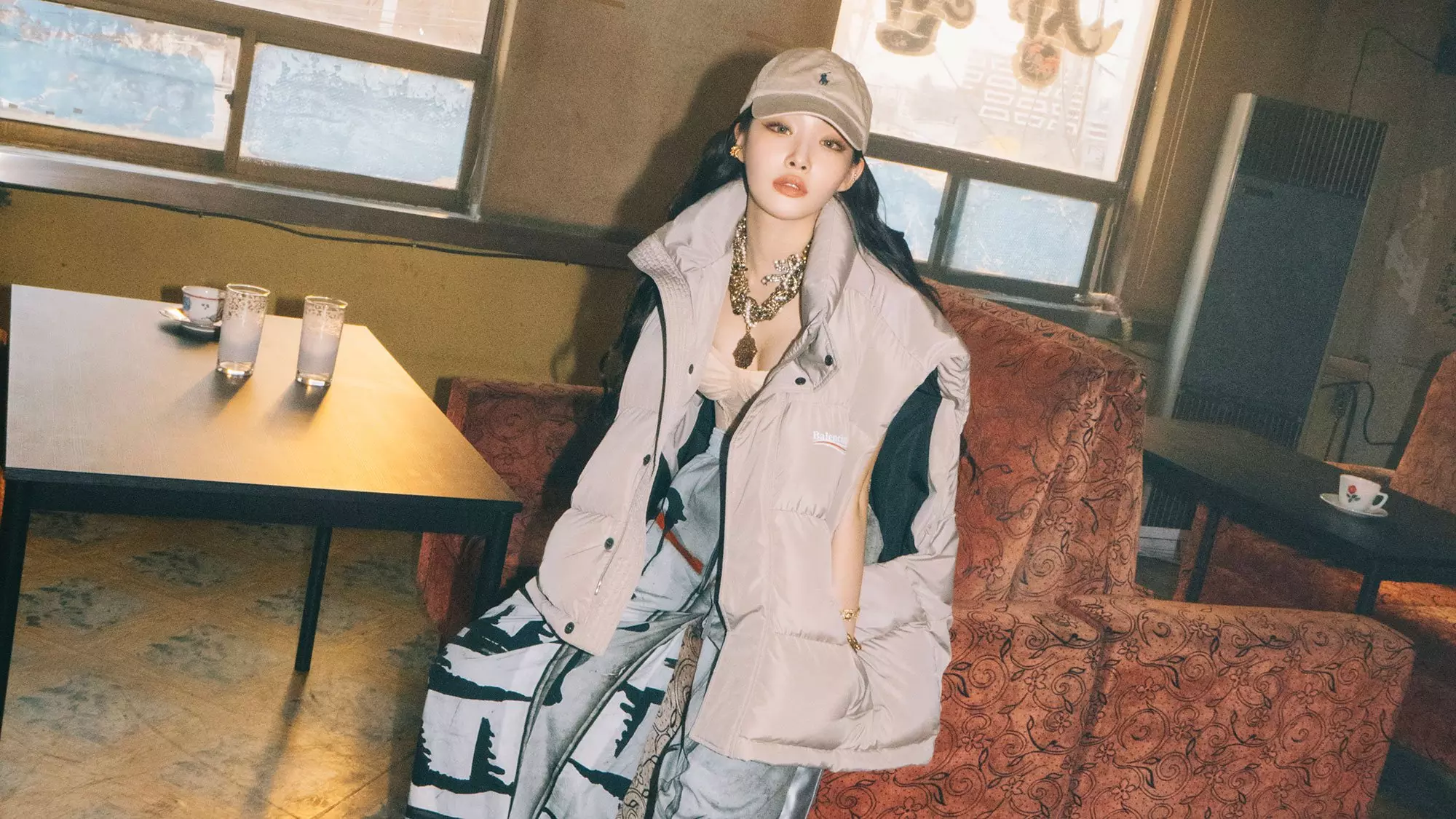
Chung Ha Returns: On 'EENIE MEENIE,' The K-Pop Soloist Is Ready To Step Back Into The Spotlight
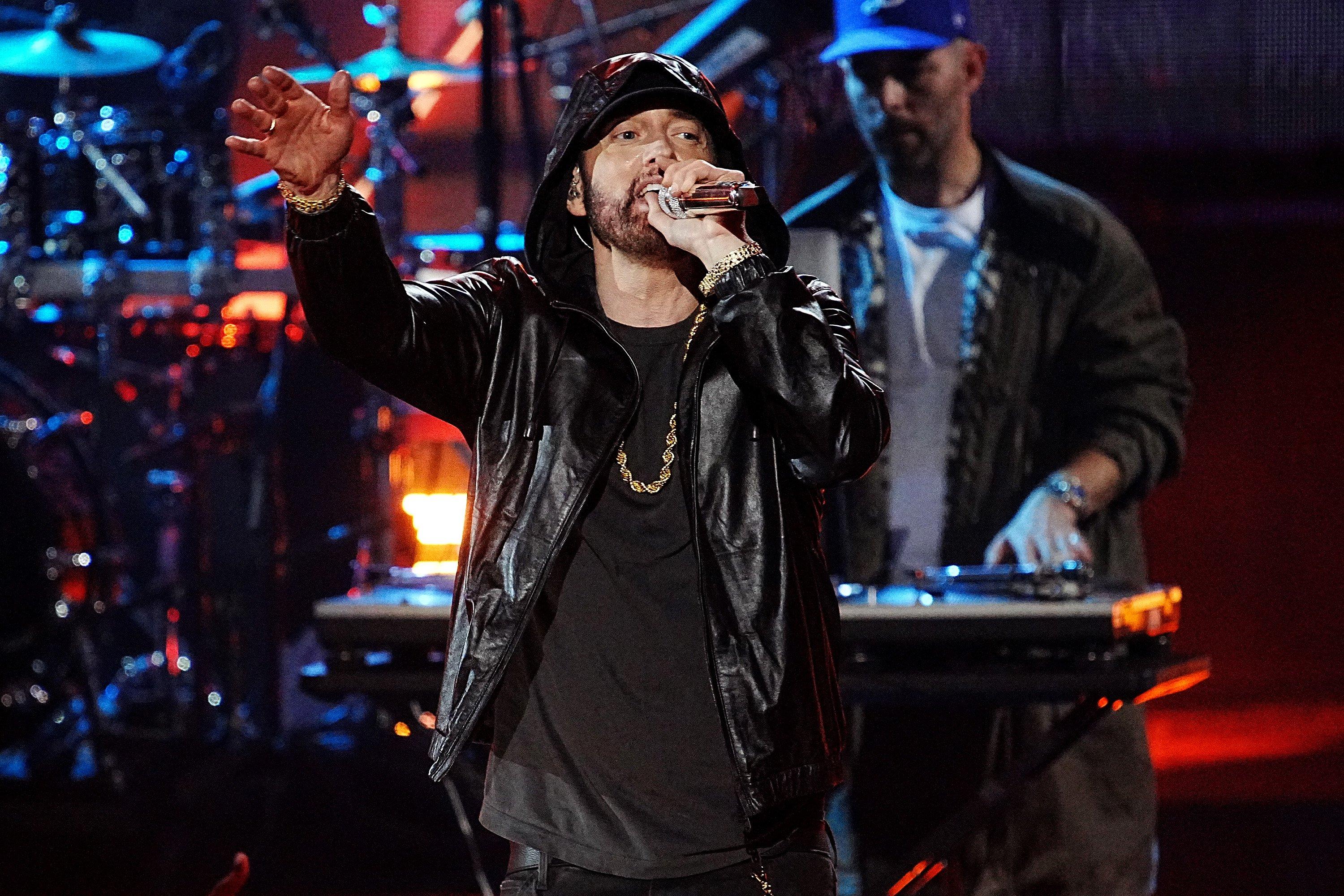
Photo: Jeff Kravitz/FilmMagic via Getty Images
list
New Music Friday: Listen To New Albums & Songs From Eminem, Maya Hawke, ATEEZ & More
Dive into the weekend with music that’ll make you dance, brood and think — by Jessie Reyez, Ayra Starr, Adam Lambert, and many more.
After the cookouts and kickbacks of Memorial Day weekend, getting through the workweek is never easy. But you made it through — and now it's time for another weekend of however you decompress. As always, killer jams and musical food for thought have arrived down the pipeline.
As you freshen up your late-spring playlist, don't miss these offerings by artists across generations, moods, genres, and vibes — from K-pop to classic country and beyond.
Eminem — "Houdini"
It looks like Dua Lipa isn't the only artist to name-drop Erik Weisz this year. In a recent Instagram video with magician David Blaine, Eminem hinted at a major career move, quipping, "For my last trick, I'm going to make my career disappear," as Blaine casually noshed on a broken wineglass.
With Em's next album titled The Death of Slim Shady, fans were left in a frenzy — was he putting the mic down for good? If "Houdini" is in fact part of Eminem's final act, it seems he'll be paying homage to his career along the way: the song includes snippets of Em classics "Without Me," "The Real Slim Shady," "Just Lose It" and "My Name Is."
The superhero comic-themed video also calls back to some of the rapper's iconic moments, including the "Without Me" visual and his 2000 MTV Video Music Awards performance. It also features cameos from the likes of Dr. Dre, Snoop Dogg, 50 Cent, and Pete Davidson — making for a star-studded thrill ride of a beginning to what may be his end.
Read More: Is Eminem's “Stan” Based On A True Story? 10 Facts You Didn't Know About The GRAMMY-Winning Rapper
Maya Hawke — 'Chaos Angel'
"What the Chaos Angel is to me," Maya Hawke explained in a recent Instagram video, "is an angel that was raised in heaven to believe they're the angel of love, then sent down to do loving duties."
Chaos Angel, the third album by Maya Hawke, out via Mom+Pop Records, is an alt-rock treasure with a psychologically penetrating bent. Smoldering tracks like "Dark" and "Missing Out" plumb themes of betrayal and bedlam masterfully.
Jessie Reyez & Big Sean — "Shut Up"
Before May 31, Jessie Reyez's 2024 releases have come in the form of airy contributions for Bob Marley: One Love and Rebel Moon. And for the first release of her own, she's bringing the heat.
Teaming up with fellow rapper Big Sean for "Shut Up," Reyez delivers some fiery lines on the thumping track: "They b—es plastic, that b— is a catfish, oh-so dramatic/ And I'm sittin' pretty with my little-ass t—es winnin' pageants." Big Sean throws down, too: "B—, better read the room like you telepromptin'/ And watch how you speak to a n—a 'cause I'm not them."
Foster the People — "Lost In Space"
Indie dance-pop favorites Foster The People — yes, of the once-inescapable "Pumped Up Kicks" fame — are back with their first new music since 2017's Sacred Hearts Club. The teaser for their future-forward, disco-powered new song, "Lost in Space," brings a psychedelic riot of colors to your eyeballs.
The song is equally as trippy. Over a swirling, disco-tinged techno beat, the group bring their signature echoing vocals to the funky track, which feels like the soundtrack to an '80s adventure flick.
"Lost in Space" is the first taste of Foster The People's forthcoming fourth studio album, Paradise State of Mind, which will arrive Aug. 16. If the lead single is any indication — along with frontman Mark Foster's tease that the album started "as a case study of the late Seventies crossover between disco, funk, gospel, jazz, and all those sounds" — fans are in for quite the psychedelic ride.
Arooj Aftab — 'Night Reign'
Arooj Aftab landed on the scene with the exquisitely blue Vulture Prince, which bridged modern jazz and folk idioms with what she calls "heritage material" from Pakistan and South Asia. The album's pandemic-era success threatened to box her in, though; Aftab is a funny, well-rounded cat who's crazy about pop music, too. Crucially, the guest-stuffed Night Reign shows many more sides of this GRAMMY-winning artist — her sound is still instantly recognizable, but has a more iridescent tint — a well-roundedness. By the strength of songs like "Raat Ki Rani" and "Whiskey," and the patina of guests like Moor Mother and Vijay Iyer, this Reign is for the long haul.
Learn More: Arooj Aftab, Vijay Iyer & Shahzad Ismaily On New Album Love In Exile, Improvisation Versus Co-Construction And The Primacy Of The Pulse
Willie Nelson — 'The Border'
By some counts, Willie Nelson has released more than 150 albums — try and let that soak in. The Red Headed Stranger tends to crank out a Buddy Cannon-produced album or two per year in his autumn years, each with a slight conceptual tilt: bluegrass, family matters, tributes to Harlan Howard or the Great American Songbook. Earthy, muted The Border is another helping of the good stuff — this time homing in on songwriters like Rodney Crowell ("The Border"), Shawn Camp ("Made in Texas") and Mike Reid ("Nobody Knows Me Like You.") Elsewhere, Nelson-Cannon originals like "What If I'm Out of My Mind" and "How Much Does It Cost" fold it all into the 12-time GRAMMY winner's manifold musical universe.
ATEEZ — 'GOLDEN HOUR : Part.1'
South Korean boy band ATEEZ last released new material with late 2023's The World EP.Fin: Will. Now, they're bringing the K-pop fire once again with their 10th mini-album, GOLDEN HOUR Part.1.
Released in a rainbow of physical editions, the release was teased by a short clip for "WORK," where ATEEZ pans for gold like old prospectors in an off-kilter desert scene, then proceeds to throw the mother of all parties. As for the rest of GOLDEN HOUR, they bring flavors of reggaeton ("Blind), wavy R&B ("Empty Box") and reggae ("Shaboom") — further displaying their versatility as a group, and setting an exciting stage for Part.2.
Learn More: Inside The GRAMMY Museum's ATEEZ & Xikers Pop-Up: 5 Things We Learned
Ayra Starr — 'The Year I Turned 21'
Beninese-Nigerian singer and GRAMMY nominee for Best African Music Performance Ayra Starr pays homage to the big two-one with her second album, The Year I Turned 21, which she's been teasing all month. We've seen the crimson, windswept cover art; we've soaked up the 14 track titles, which reveal collaborations with the likes of ASAKE, Anitta, Coco Jones, and Giveon. Now, after small tastes in singles "Commas,""Rhythm & Blues" and "Santa" (with Rvssian and Rauw Alejandro), we can behold what the "Rush" star has called "excellent, sonically amazing" and "unique, because I've been evolving sonically."
Watch: Ayra Starr’s Most Essential “Item” On The Road Is Her Brother | Herbal Tea & White Sofas
Adam Lambert — "LUBE" & "WET DREAM"
The "American Idol" and Queen + Adam Lambert star is turning heads — for very good reason. He's going to release AFTERS, a new EP of house music and an unflinching exploration of queerness and sex-positivity. "I throw many house parties and my aim was to create a soundtrack inspired by wild nights, giving a voice to our communities' hedonistic desires and exploits," Lambert explained in a press release.
The first two singles, "LUBE" and "WET DREAM," achieve exactly that. From the pulsing beat of "LUBE" (along with the "Move your body like I do" demand of the chorus) to the racing melody of "WET DREAM," it's clear AFTERS will bring listeners straight to a sweaty dance floor — right where Lambert wants them.
Wallows Talk New Album Model, "Entering Uncharted Territory" With World Tour & That Unexpected Sabrina Carpenter Cover
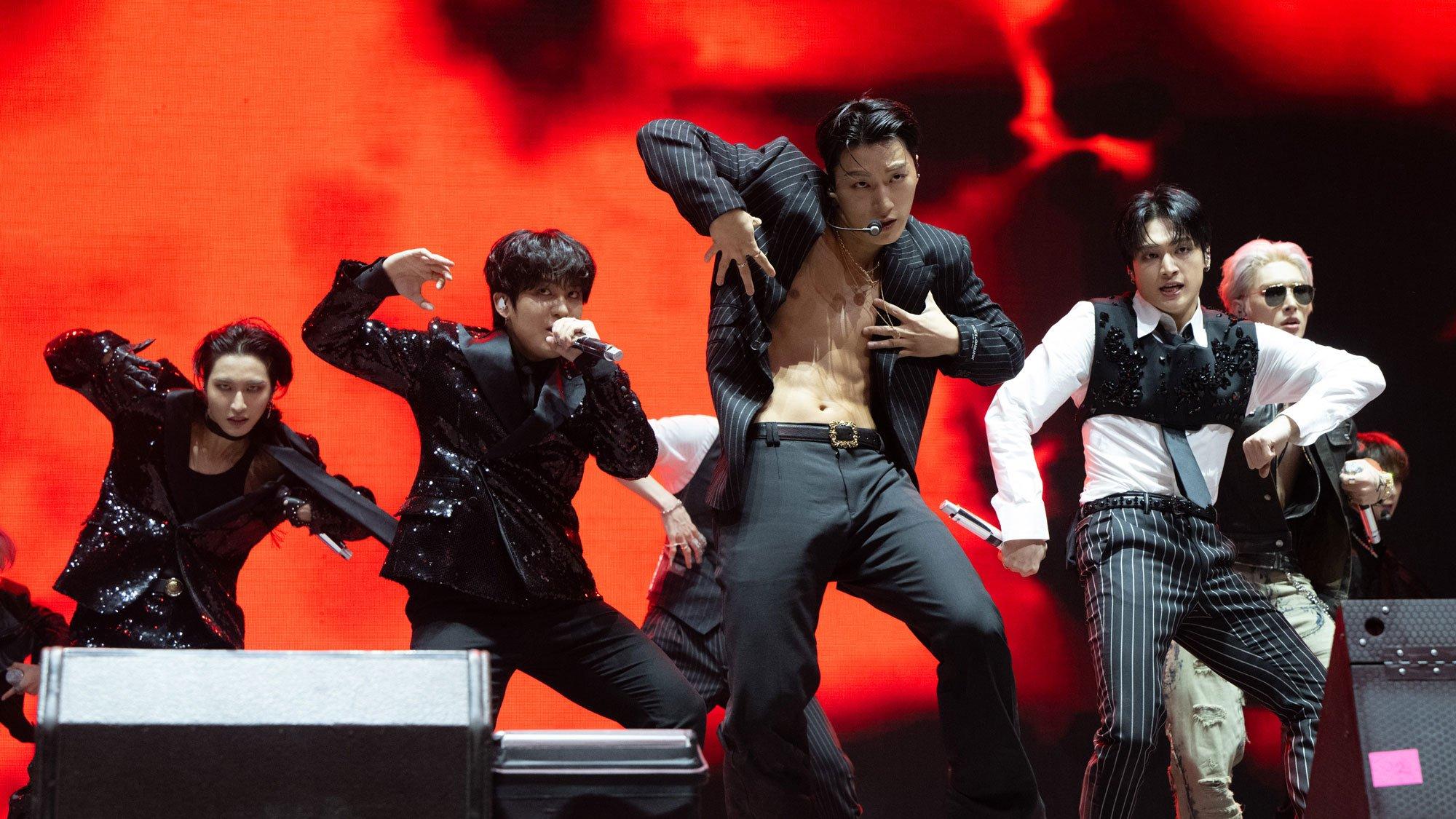
Photo: Scott Dudelson/Getty Images for Coachella
list
K-Pop Summer 2024 Guide: ATEEZ, IU, TXT & More Live In Concert & On Tour
Whether you want to have your Head in the Clouds, go over the moon at KCON or head Towards the Light, plan out your summer with these K-pop events and tours featuring TWICE, LE SSERAFIM, Stray Kids and more.
2024 has had a handful of memorable K-pop moments in North America so far. From boy group ONEUS's La Dolce Vita tour to TWICE's one-night-only show at Las Vegas' Allegiant Stadium in March, the industry has kept a steady flow of entertainment for lovers of Korean music and culture. Last month, ATEEZ, LE SSERAFIM, and indie band The Rose also left their mark at Coachella Festival in California, proving that K-pop acts at major festivals are a rising trend.
With summer right around the corner, even more tours, festivals, and conventions are set to pop up across the U.S., Canada, and Mexico. From mid-May to September, whether on weekdays or weekends, there will always be something to do or someone to see. Among the most-awaited events are singer IU's first world tour and ATEEZ's massive trek in July, as well as Stray Kids, IVE, and VCHA's performances at Chicago's Lollapalooza Festival.
To help you enjoy the most out of this busy season, GRAMMY.com assembled a list of all the K-pop concerts and events happening in the next few months below.
May
CIX: 0 or 1 in North America
May 10-26
Boy group CIX will be back in North America for their third tour this May. Named after single album 0 or 1, the stint will cover eight cities across the U.S., Mexico, and Canada, starting in Chicago, IL and wrapping it up in Los Angeles, CA. The quintet will likely perform hits like "Cinema" and "Movie Star," as well as their latest single, "Lovers or Enemies," and celebrate their upcoming fifth anniversary.
Head in the Clouds Festival
Forest Hills, New York
May 11-12
Following the success of last year's edition in Queens, New York, Head in the Clouds Festival returns to the big apple in 2024. In their mission to spread Asian diaspora talent, the lineup for this year enlists (G)I-DLE to headline on Saturday and singer BIBI on Sunday, along other names like ATARASHII GAKKO! and Joji. Korean acts Balming Tiger, Wave to Earth, and newcomer girl group Young Posse will also join them. HITC Festival is usually based in Los Angeles, but this year's L.A. edition has yet to be announced.
BM (KARD): After the After Party Tour
May 14-25
Hailing from co-ed group KARD, Korean-American singer BM will kick off his first U.S. solo tour in mid-May. After the After Party Tour was inspired by the track "ATAP (After the After Party)," off his December single album, Lowkey. BM will perform in six cities across the country, including Los Angeles, Chicago, and New York. He also teased an EP soon, and stated that he will be "taking new music on this tour."
P1Harmony: P1ustage H : UTOP1A Tour
May 14 - Jun. 16
Boy band P1Harmony is also returning to North America with their third tour, P1ustage H: UTOP1A. Beginning in Houston, TX, on May 14, it will follow with shows in Chicago, Boston, Los Angeles, and more — including a prestigious performance on June 8 at New York City's Governors Ball Music Festival 2024. The sextet released their first studio album, Killin' It, in February of this year.
Tomorrow X Together (TXT): ACT : PROMISE World Tour
May 14 - Jun. 8
A TXT tour in the U.S. has become an annual event: following 2022's ACT : LOVESICK and 2023's ACT : SWEET MIRAGE, 2024 welcomes ACT : PROMISE. Featuring 11 shows across the country, the boy group will play in Houston, Atlanta, Los Angeles, and more. They will also perform two nights at New York's legendary Madison Square Garden before heading to the Japanese leg of the tour in July.
Wheein (MAMAMOO): Whee In The Mood [Beyond] World Tour
May 17 - Jun. 4
Powerhouse vocalists MAMAMOO hit stateside last year with their MY CON World Tour, a first for the group. Now, it's member Wheein's turn to celebrate her solo career with Whee In The Mood [Beyond] World Tour, inspired by her first LP, 2023's In The Mood. After a slew of shows in Asia and Europe, the singer will head to San Francisco, CA, for the first out of eight concerts in the U.S. Other cities include Dallas, Orlando, Los Angeles, and New York.
RIIZE: RIIZING Day Fan-Con World Tour
Los Angeles, California
May 20
SM Entertainment's freshest rookies RIIZE announced their first fan-con, RIIZING Day, to take place from May to August in various cities across the globe. After playing in Seoul, Tokyo, and Mexico City, the boyband will come to Los Angeles for a single performance at the Peacock Theater on May 20. RIIZE are expected to play their compact yet dynamic discography, including singles "Get A Guitar," "Talk Saxy," and "Impossible."
June
Purple Kiss: 2024 BXX Tour
June 2 - July 2
It's not even been a year since Purple Kiss toured the U.S. with their The Festa Tour in fall 2023, but they're already gearing to come back. Starting June 2 in Oceanside, CA, the 2024 BXX Tour will take the girl group to seven cities in the U.S. and nine cities in Canada, closing it off in Halifax, Nova Scotia, on July 2. This is a big chance for fans who missed their performances last year, or simply to those who want to see singles like "Zombie" and "Sweet Juice" live again.
ITZY: Born to Be World Tour
June 6-28
Girl group ITZY has spent the majority of 2024 bringing their second world tour, Born to Be, across Oceania, Asia, Latin America, and Europe. In June, they will finally step in North America for a 10-stop stint, including cities like Seattle, Los Angeles, Newark, Fairfax, Toronto, and more. Despite featuring only four out of five members while vocalist Lia is currently on hiatus due to health reasons, they promise to set the stages on fire with their high-energy discography.
VERIVERY: Go On Fan-meeting Tour
Jun. 14-23
Starting June 14, boyband VERIVERY will kick off their Go On Fan-meeting Tour in New York at Brooklyn Steel. Then, they will head to Chicago, Minneapolis, Atlanta, Fort Worth, and finally Los Angeles for a last performance at Vermont Hollywood. The seven-member group is currently a quartet, as member Dongheon is currently enlisted in the military, and members Minchan and Hoyoung are on hiatus due to health concerns. VERIVERY's latest release was 2023's EP, Liminality.
A.C.E: 2024 REWIND_US U.S. Tour
Jun. 19 - July 18
February marked the much-anticipated comeback of boy group A.C.E with the EP My Girl: My Choice. It was their first release in three years, and to rejoice further, the quintet announced an extensive 14-date tour throughout the U.S. and Puerto Rico. Starting June 19 in Madison, WI and closing off on July 18 in San Juan, PR, A.C.E will also perform in Los Angeles, Nashville, New York, and more.
HYO: Milwaukee Summerfest
Milwaukee, WI
Jun. 28
HYO, also known as Hyoyeon from Girls' Generation, will be showcasing her DJ chops on June 28 at Milwaukee Summerfest. The performance will happen just months after HYO held her 2024 Spring U.S. Tour, Cherry Blossom, which spanned seven cities across the country. In the setlist, fans can expect hits like "Dessert" and "Deep," but also some innovative remixes of other artists' songs, like GALA's "Freed From Desire" and Girls' Generation's "Gee."
July
AB6IX: Find You Fan Concert Tour
Jul. 3-21
Another boy group to embark on a North American tour this year, AB6IX will bring their Find You Fan Concert across nine stops in the U.S., Mexico, and Canada. Starting off in the cities of Toronto and Montreal, they will then head to New York, Mexico City, Miami, Denver, and more, before wrapping it up in Los Angeles. The tour title was inspired by their latest release, January's EP The Future is Ours: Found.
ATEEZ: Towards the Light: Will to Power 2024 World Tour
Jul. 14 - Aug. 11
Performance kings ATEEZ never stop. After the release of their EP, Golden Hour: Part. 1 on May 31, the eight-member group will head to North America for their Towards the Light: Will to Power 2024 World Tour. Kicking off on July 14 in Tacoma, Washington, the boyband will also play in the cities of Los Angeles, Arlington, Washington, D.C., Toronto, New York, and more. The tour supports ATEEZ's December 2023 LP, The World EP.Fin: Will, but hopefully the setlist will include surprises as new music comes out.
IU: HEREH World Tour
Jul. 15 - Aug. 2
One of the most important artists to come from South Korea, IU (born Lee Ji-eun) has been shaping the country's music industry since 2008 with her unique voice, sensitive songwriting, and sharp mind. Given her journey, it's almost absurd that her first world tour is only happening in 2024 — but better late than never. After stops in Asia and Europe, IU will head to the U.S. for six sold-out concerts, beginning on July 15 at Prudential Center in Newark, NJ, and concluding on August 2 at Kia Forum in Los Angeles, CA.
The Boyz: Zeneration II World Tour
Jul. 19-28
Following their 2023 Zeneration Tour, which featured 24 stops across Asia, 11-member group The Boyz are now bringing its sequel worldwide. After a 3-day July stint in Seoul, South Korea, the Zeneration II tour will head to the U.S. for five shows in New York, Atlanta, Dallas, Los Angeles, and San Jose. Throughout August, The Boyz will segue onto the Asian leg of the tour, wrapping it up with a few European dates in September.
KCON Los Angeles 2024
Jul. 26-28
Known as the largest Korean culture and music festival in North America, KCON has a decade-long legacy of serving as a bridge for "all things Hallyu." Held at the Los Angeles Convention Center and Crypto.com Arena, the festival includes a two-night concert, fan signings, food and merch stalls, panels with professionals in the industry, and many other attractions. KCON hasn't announced its official lineup yet, but attendees can expect it to maintain the same excellence of past years.
Secret Number: The 1st U.S. Tour 2024 Unlock
Jul. 26 - Aug. 10
Girl group Secret Number debuted amidst the chaos of 2020's COVID-19 pandemic, therefore falling short of live experiences with their fans. As they enter their fourth year together, they will finally meet North American fans with their 2024 Unlock tour this summer. Kicking off on July 26 in Chicago, the sextet will then head to Minneapolis, Charlotte, Houston, Denver, Phoenix, Seattle, and Los Angeles for a final show on August 10.
August
Stray Kids, IVE, VCHA: Lollapalooza Chicago 2024
Aug. 1-4
K-pop's presence on Lollapalooza continues to expand. This year, Stray Kids is set to headline on Friday, Aug. 2, alongside singer SZA. It's the boyband's second appearance at the festival, following their 2023 show at Lollapalooza Paris. On that same day, U.S.-based, K-pop-trained girl group VCHA, formed by JYP Entertainment in partnership with Republic Records, will also make their first performance at the festival. To close it off, Saturday will feature the captivating girl group IVE.
I.M (Monsta X): Off The Beat 2024 World Tour
Aug. 8-31
Monsta X's maknae (youngest member) I.M has been building a prolific solo career while his teammates are enlisted in the military. Accompanying his third EP, Off The Beat, the singer announced an eponymous world tour, featuring 19 stops in Asia, North America, and Europe. He will play seven dates In the U.S. and two in Canada, including New York, Boston, Toronto, and more.
ARTMS: 2024 Moonshot World Tour
Aug. 16 - Sept. 10
Formed by five LOONA members (Kim Lip, Choerry, JinSoul, HaSeul, and HeeJin), girl group ARTMS was one of 2023's most-awaited debuts. Their first studio album, Devine All Love & Live, is set to drop on May 31, and the quintet will celebrate with a string of concerts across South Korea, Japan, and the U.S. Starting August 16 in New York, the tour will cross Atlanta, Orlando, Los Angeles, and more cities before wrapping up on September 10 in Chicago.
11 Rookie K-Pop Acts To Know In 2024: NCT Wish, RIIZE, Kiss Of Life & More
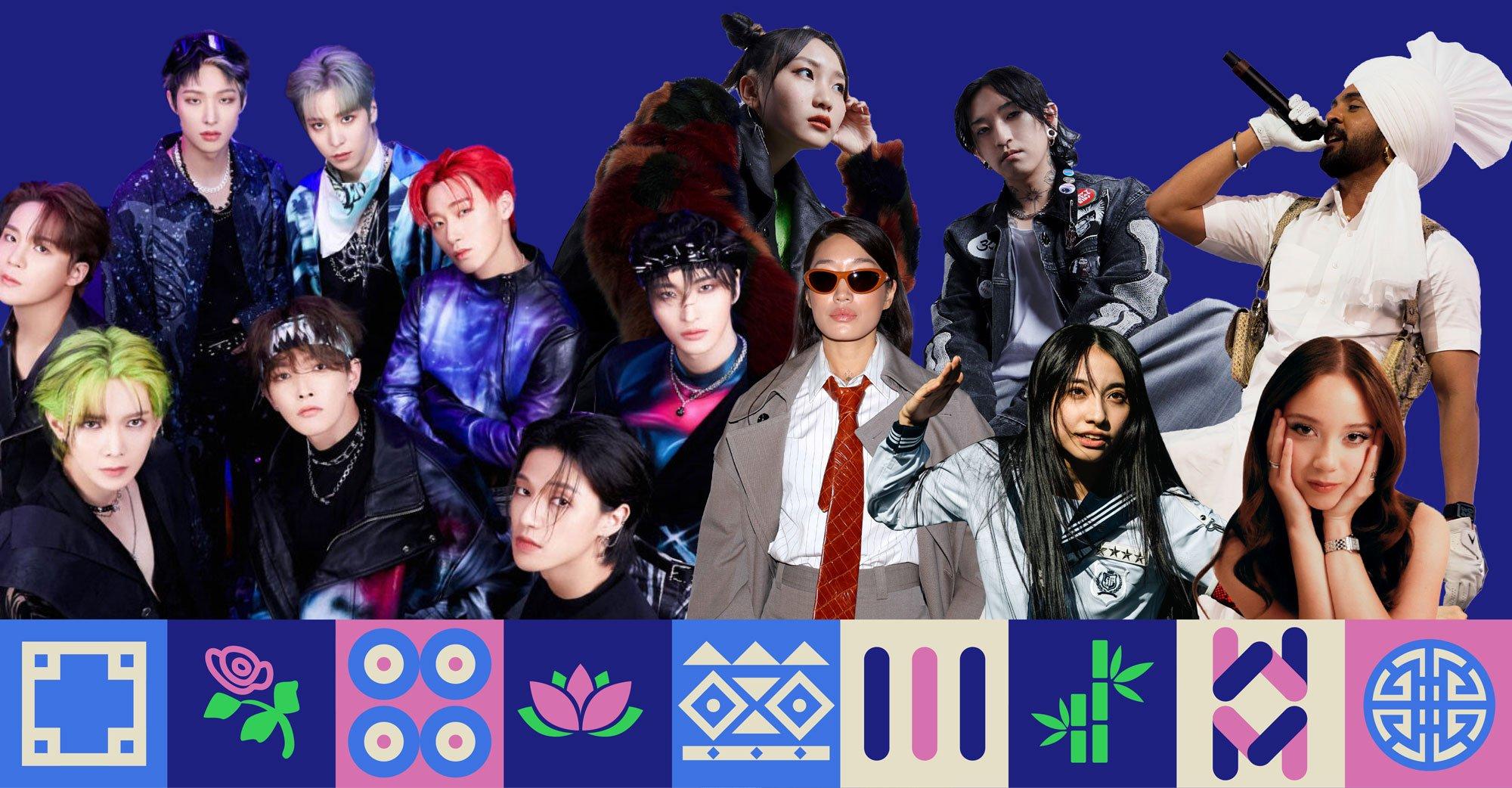
Photos: KQ Entertainment; KATO SHUMPEI; Vittorio Zunino Celotto/Getty Images; Medios y Media/Getty Images; Presley Ann/Getty Images for Coachella; Lauren Kim
news
Leap Into AAPI Month 2024 With A Playlist Featuring Laufey, Diljit Dosanjh, & Peggy Gou
Celebrate AAPI artists this May with a genre-spanning playlist spotlighting festival headliners and up-and-coming musicians. From Korean hip-hop to Icelandic jazz-pop, listen to some of the most exciting artists from the Asian diaspora.
With spring just around the corner, it’s time to welcome AAPI Month in full blossom. From rising musical artists to inspiring community leaders, it’s essential to recognize AAPI members of the artistic world and their achievements.
While AAPI Month is a U.S. holiday, the Recording Academy takes a global approach in celebrating artists and creators from across the Asian and Asian American diaspora. This aligns with the Recording Academy's growing mission to expand its reach on a global scale and celebrate international creators outside of the U.S.
Musicians of Asian American, Native Hawaiian and Pacific Islander heritage have not only helped establish the music industry, but have transformed it. From Diljit Dosanjh being the first artist to play a Coachella set entirely in Punjabi to Laufey winning a GRAMMY for her jazz-inspired pop, AAPI artists continue to influence music by both honoring tradition and reshaping modern standards.
It’s thrilling to see AAPI musicians continue to take centerstage — from Atarashi Gakko! to Tiger JK’s memorable sets at Coachella, to surprise appearances from Olivia Rodrigo, Dominic Fike, and Towa Bird. As festival season gets underway, examples of the AAPI starpower from every corner of the world abound.
As one of many ways to celebrate AAPI Month, listen to the GRAMMY.com playlist below — as a reminder to give AAPI musicians not just their May flowers, but their flowers all year-round!
